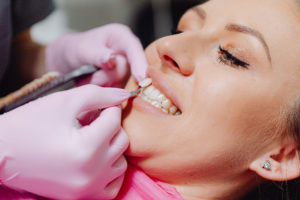 Modern veneers and crowns are made of high-quality, durable materials that can withstand the pressure of biting and chewing. However, before you get your permanent restorations, you’re going to need temporary veneers or crowns to protect your teeth for a couple of weeks. They aren’t as strong as your final restorations, so your dentist will recommend sticking to softer foods. Not sure what to eat with temporary veneers in Panama City? Here’s how to maintain a healthy diet while ensuring your short-term restorations last.
Modern veneers and crowns are made of high-quality, durable materials that can withstand the pressure of biting and chewing. However, before you get your permanent restorations, you’re going to need temporary veneers or crowns to protect your teeth for a couple of weeks. They aren’t as strong as your final restorations, so your dentist will recommend sticking to softer foods. Not sure what to eat with temporary veneers in Panama City? Here’s how to maintain a healthy diet while ensuring your short-term restorations last.
Foods You Should Not Eat
The bonding material holding your crown or veneer is a temporary cement, so there’s a chance your restoration can pop off if you eat certain foods, like:
- Hard or sticky candy
- Biscuits, chips, or crackers
- Chocolate bars
- Raw fruits or vegetables
- Hard toast or crunchy bread
- Ice cubes
- Tough meat
- Hard-skinned fruit
- Dark foods and drinks
- Hot foods or drinks
Your dentist will recommend cutting your food into small pieces to make them easier to chew. This will reduce pressure on your temporary dental restorations to avoid displacing them.
Soft Foods You Should Eat
You can still eat a variety of healthy and filling foods, even with certain restrictions. The University of Michigan recommends a balanced diet that contains enough calories and protein to support your body. Here are some examples that are safe for your temporary crowns or veneers:
- Soft bread
- Soft fruits
- Broth
- Pasta
- Noodles
- Mashed potatoes
- Eggs
- Oatmeal
- Yogurt
- Soups
- Smoothies
- Chicken or fish
It’s not unusual to have mild sensitivity when eating anything too hot or cold. Although you’ll have to avoid them for a few weeks, it will subside after getting your restorations.
Eating with Veneers or Crowns
Once your permanent crowns or veneers are in place, it may take a few days to adjust to them, but they’ll feel natural in no time at all. You may soon forget they aren’t part of your real teeth; however, you’ll still want to limit some foods to ensure your investment lasts, like:
- Hard or chewy foods
- Dark-colored foods and drinks
- Alcoholic beverages
- Sugary foods and drinks
Besides watching what you eat, your dentist will have a few additional tips to prolong the lifespan of your restoration, including:
- Commit to a good oral hygiene routine at home and visit your dentist regularly for a cleaning and checkup.
- Don’t use your teeth in place of scissors or other tools.
- Keep inedible objects out of your mouth, like your fingernails or pencils.
- Don’t smoke.
- Wear an athletic mouthguard if you play sports.
- Wear a nightguard if you grind or clench your teeth.
Your dentist will tell you everything you need to know to ensure your restorations thrive for a decade or more.
About Dr. Faris Waheed
Dr. Waheed achieved his dental degree at the Tufts University School of Dental Medicine and has completed continuing education in many advanced services, like dental implants, oral sedation, and cosmetic dentistry. If you need a crown or veneers, contact our office today to schedule your consultation with an award-winning dentist.
